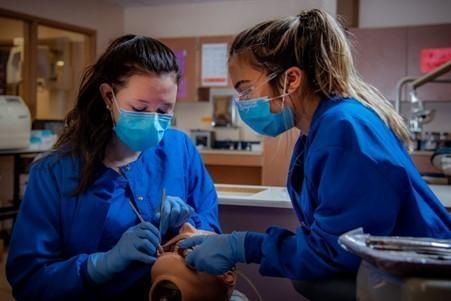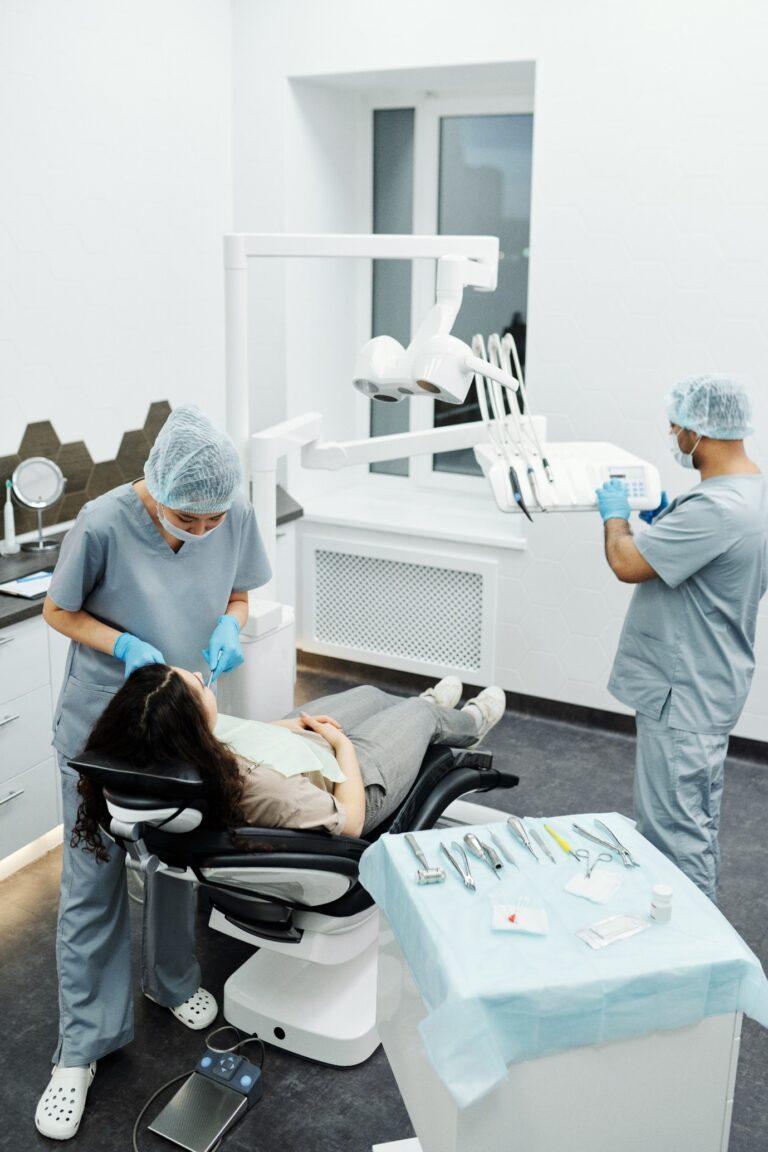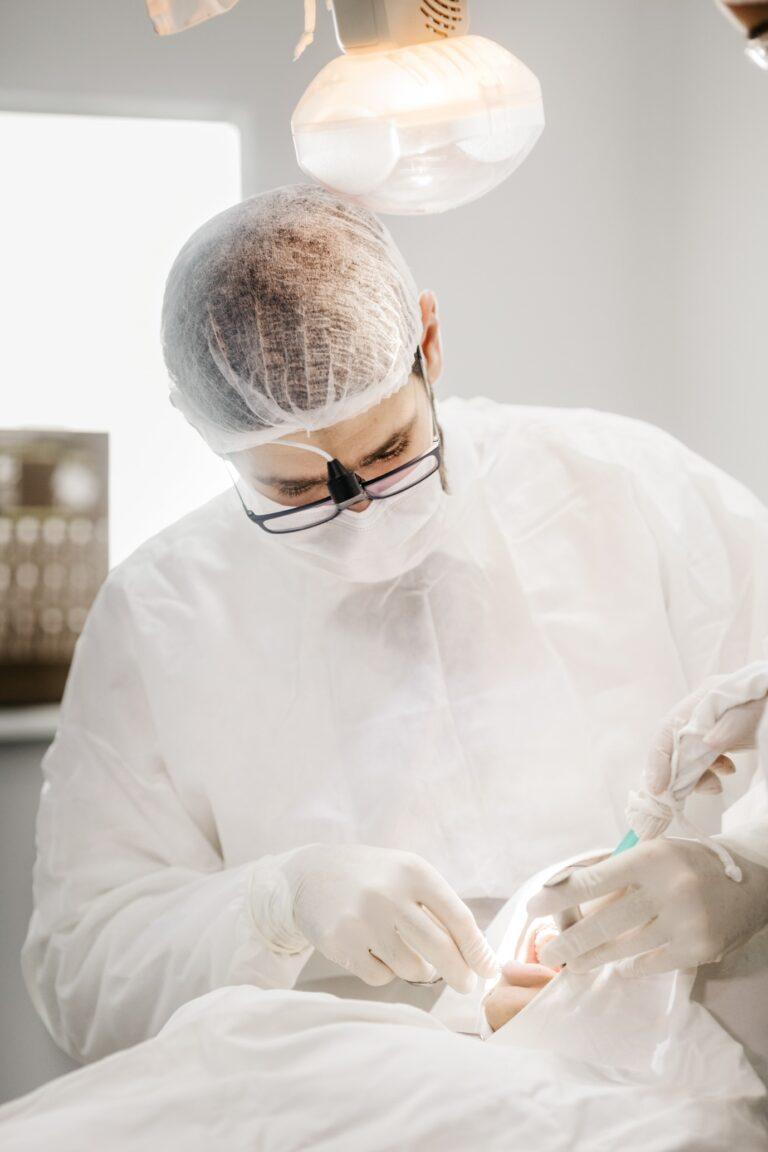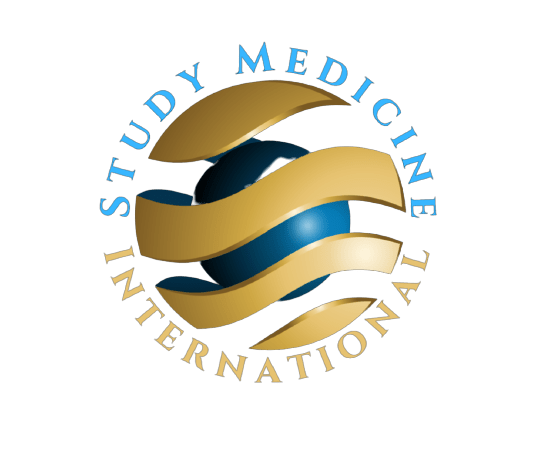Dentistry
Dental Medicine
Doctor of Dental Medicine
Bachelor of Dental Surgery (BDS)
Dentistry with Study Medicine International ( S M I )
Dentistry is a diverse field that combines scientific knowledge, advanced technology, and practical skills to diagnose, treat, and prevent oral diseases and conditions, while also promoting and maintaining overall oral health and quality of life. Given its immense significance, it demands a team of highly skilled and dedicated professionals who can shoulder the responsibility of safeguarding and enhancing the well-being of their patients.
The field of dentistry is continuously evolving with the latest technological advancements and treatment methods. However, much still remains to be discovered and understood about the complexities of the oral cavity and each person’s unique dental needs. This is why each patient requires a tailored, individualised approach to oral healthcare.


Dentistry is an incredibly demanding and challenging field, but it is also one of the most rewarding and fulfilling areas of study. The complexity of the work makes it all the more fascinating, and the rewards of helping people achieve and maintain healthy smiles are immeasurable. If you are someone who enjoys taking on challenging tasks, seeking innovative solutions, and are a hard worker who loves interacting with people, then dentistry may be the perfect fit for you. As a dental professional, you have the opportunity to positively impact numerous lives by providing essential dental care and transforming patients’ smiles. Being able to change someone’s life for the better and bring happiness to both the patient and their loved ones is an incredibly rewarding experience that makes all the hard work worth it.
Why choose dentistry as a profession?
Making a difference in oral health: Dentists play a crucial role in promoting oral health and preventing and treating dental problems. By providing dental care, dentists help to improve the overall health and well-being of their patients.
Intellectually challenging: Dentistry requires a high level of technical and scientific knowledge, providing an intellectual challenge for those who enjoy problem-solving and critical thinking.
High earning potential: Dentists typically earn high salaries, allowing them to provide a comfortable life for themselves and their families.
Opportunities for specialisation: The field of dentistry offers a wide range of specialisations, including orthodontics, periodontics, endodontics, and more, allowing dentists to focus on areas of interest and expertise.
Personal fulfilment: The combination of the intellectual challenge and the ability to make a positive impact on people’s health can provide a high level of personal fulfilment and satisfaction.
Collaborative environment: Dentistry is a collaborative field, with dentists working alongside dental hygienists, dental assistants, and other dental professionals to provide comprehensive care for their patients.
Potential for innovation: Dentists have the opportunity to be involved in cutting-edge research and innovation, helping to advance the field of dentistry and improve patient care.
Job security: There is a high demand for dentists globally, providing job security and stability.
Flexibility: Many dentists choose to open their own practices, allowing them to have control over their schedules and create an ideal work-life balance that meets their needs.
Making a positive impact: By improving people’s oral health, dentists play a vital role in improving their overall health and well-being, making a positive impact on individuals and communities.


Life as Sucessful Graduate
As a successful graduate student, it is essential to attain a strong grasp of both established and developing biomedical, clinical, social, behavioural, and population sciences. Moreover, one should possess the skills to identify and evaluate new information relevant to a particular question and apply this knowledge to clinical problem-solving and scientific inquiry.
By the time of graduation, you will be able to:
- Knowledge and Inquiry:
- Understand established and evolving biomedical, clinical, social, behavioural, and population sciences
- Apply knowledge to clinical problem-solving and scientific inquiry
- Identify and assess new information relevant to a question
- Engage in scholarly inquiry to advance knowledge and personal growth
- Patient Care:
- Provide evidence-based, compassionate care for patients
- Collect and interpret relevant data to establish a diagnosis and management plan
- Work effectively as part of an interprofessional team
- Obtain patient information and perform diagnostic procedures
- Professionalism:
- Demonstrate commitment to professional responsibility, integrity, and accountability
- Adhere to ethical principles and moral reasoning
- Exemplify professional values of medicine
- Prioritise the needs of others and maintain personal wellness
- Interpersonal and Communications Skills:
- Build collaborative and trusting relationships with patients, families, and colleagues
- Communicate effectively with patients and families to promote informed consent and shared decision making
- Effectively communicate medical information with fellow health professionals
- Demonstrate interpersonal skills to be an effective contributor or leader on a team
- Organisational and Social Determinants of Health Care:
- Advocate for patients to improve health outcomes at individual and society level
- Operate effectively within health systems and improve those systems
- Demonstrate understanding of social determinants of health and opportunities to address health disparities
- Provide care with cultural humility and appreciation for diverse populations


You will attain the following key graduate skills:
Critical thinking and problem-solving: the ability to analyse and solve complex problems using logical and creative thinking.
Communication skills: the ability to convey information clearly and effectively, both verbally and in writing, to diverse audiences.
Collaboration and teamwork: the ability to work effectively with others to achieve common goals and objectives.
Adaptability and flexibility: the ability to adjust to changing circumstances, be open to new ideas and approaches, and learn from experiences.
Leadership and management: the ability to lead, motivate, and manage individuals and teams to achieve desired outcomes.
Initiative and self-motivation: the ability to take independent action, set goals, and take responsibility for one’s own learning and professional development.
Digital literacy: the ability to use technology effectively and efficiently, including digital communication tools and various software applications.
Cultural awareness and global citizenship: the ability to understand and appreciate different cultures and perspectives, and work effectively in diverse settings.
Ethics and social responsibility: the ability to recognise ethical issues, make responsible decisions, and act in ways that promote social and environmental responsibility.
Creativity and innovation: the ability to generate new and original ideas, products, or solutions through imagination and experimentation.

Why to Study Dentistry in Europe?
Globally
Recognised Courses
English
Taught Programs
Flexible
Admission Requirements
Affordable
Tuition Fees, Living Costs
Unlimited
University Applications
Less
Competition For Entry
Modern
Facilities & Technology
Work
Return Home, Start Practicing
Applying for dentistry in your home country can be challenging. Education is expensive and admission requirements are very high. Even if you are eligible for entry into a dental course, there’s no guarantee that you’ll be accepted. Thousands of students apply for dentistry every year, and unfortunately not all get in.
This is why many students choose to study dentistry or medicine in English in Europe.
Applying for a Doctor of Dental Medicine degree overseas is simple. Мany applicants prefer to study dentistry abroad in English rather than in the UK or their home countries. More often than not, it’s significantly more affordable as well. Not only that, but after 5 or 6 years of study, you gain your Master’s Degree in dentistry and can work anywhere in the world!
A dentistry degree in the EU or the European Economic Area will be recognised in the UK, the US, Canada, Australia, Ireland, and globally. The boundary for entry is significantly lower. Those who have unfortunately failed their exams or have received lower than expected grades due to some unforeseen circumstances can rest easy in knowing that there’s always a way to do the degree of their dreams.
Settling into the country of your choice and having a life abroad is an enlightening experience. You’ll gain a lot from meeting new people and sampling different cultures, as well as meeting like-minded students who will be more than happy to help out. You’ll end up paying less for rent and other necessities and living a more comfortable life without student debts.
European universities do not have a unified admission system. Many dental schools on the continent have devised their own entry requirements designed to target and attract the best possible applicants.
The two mandatory qualifications for all universities are secondary education and proficiency in English. Still, most schools offer a combination of the following entry requirements:
- Biology and Chemistry knowledge at the high school level
- High school diploma/GCSE/A-levels
- Multiple choice questions exam in Biology and Chemistry
- English language proficiency
- Online interview
- Personal statement
Since admission requirements are different for every European dental university, you can choose to skip the exam. Here are the universities where you can study dentistry in Europe without an entrance exam in Biology or Chemistry:
- European University of Tbilisi in Georgia
- Craiova Medical University in Romania
- Iuliu Hatieganu University in Romania
- Grigore T. Popa University in Romania
- Near East University in Cyprus
- European University in Cyprus
Note: Please bear in mind that you might have to sit an English proficiency exam if you are not coming from an English-speaking country.
Tuition fees on the continent range from €3,800 to over €30,000 per academic year. The difference in prices comes mainly from the economic state of the countries and the various fiscal rules they observe. Nonetheless, the cost of studying dentistry in Europe can be very advantageous for international students.
However, there are a few easy rules to illustrate the geographical distribution of prices. The further East you go, the lower the tuition fees get. Moreover, when you move to the North, prices get higher. Here is what these rules look like in numbers:
- The most affordable is Georgia, with tuition fees starting from €3,800 per year
- Average prices are between €5,000 and €14,000 in Romania, Bulgaria, Hungary, Slovakia, and Poland
- The most expensive are countries in Western Europe, such as Italy, Germany, and France, with prices starting from €20,000
The DMD degree you obtain from a European medical school will be recognised worldwide as they follow the highest education standards. You can start to practise as a dentist right after graduation.
The General Dental Council in the UK and the Irish Dental Council require international graduates to have at least 1600 hours of clinical experience as part of their study programme. Every dental school overseas meets this requirement. You will automatically qualify to take the Overseas Registration Exam (ORE).
All European dental schools are listed on the World Directory of Medical Schools and recognised by the World Health Organisation. This means that the USA and Canada will accept your degree and grant you the right to apply for licensure.
To register in Australia, you must have passed a dental degree that includes at least 4 years of full-time academic study, and dental degrees in Europe are either 5 or 6 years long.
The top 10 universities to study dentistry in Europe for international students are:
- European University Tbilisi in Georgia – €4.200 per year
- Sofia Medical University in Bulgaria – €8,000 per year
- Plovdiv Medical University in Bulgaria – €8,000 per year
- The Medical University of Silesia in Poland – €12,000 per year
- The Medical University of Warsaw in Poland – starting from €16,000 per year
- Titu Maiorescu University in Romania – starting from €9,000 per year
- The Semmelweis University of Medicine in Hungary – €16,400 per year
- Riga Stradins University (RSU) in Latvia – €14,000 per year
- Pavol Jozef Safarik University in Slovakia – €11,000 per year
- Charles University in the Czech Republic – €12,400 per year
Check out the full list of medical and dental schools in Europe that teach in English. If you’d like to save hours of researching on your own, contact an expert advisor now for FREE advice on your best options abroad.
There are special online courses designed for dental students who prefer distance learning. These courses are also taught in English and recognised by Medical Councils worldwide. Only Dnipro Medical Institute in Ukraine currently offers these online courses, and hundreds of students have already signed up.
You will study the preclinical subjects from years 1 and 2 of dentistry via virtual lectures led by teaching dentists. Your schedules and curriculums will ensure a smooth learning experience. Virtual classes will be recorded for you to review later. There’s an online portal where all study materials are available. Exams will also be held online.
For the clinical years of dentistry, you can travel to Ukraine and do your clinical rotations there or organise them yourself in your home country. If you choose the second option, the university will recognise your rotations when you provide the proper documentation from your teaching hospital of choice.
The courses are generally split into pre-clinical and clinical years. The first couple of years of study focuses more on fundamental knowledge such as Anatomy, Biochemistry, and Physiology.
The clinical years are more practical-based. Here is where you’ll gain experience and try out the technical knowledge you’ve learned at dentistry universities abroad. You will interact with patients and treat their dental problems daily.
After your studies, you can work anywhere in the world! This is a popular option for students looking to follow their dreams of studying dentistry but, due to unfortunate circumstances (or even a large volume of applicants for a small number of places), cannot do so. There’s always a way in the end!
Sometimes you might end up in a better position than if you had just let that opportunity pass you. There are hundreds, if not thousands, of students who make the jump and aim for their goals with relative ease. That could be you, after all.
You can schedule a call with one of our expert student advisors at no cost. The consultation is free of charge, and it’s through WhatsApp, so there are no extra phone call fees. Our student advisors will help you find the perfect university based on your preferences for tuition fees, cultural experience, and personal preferences.
Medlink Students guarantees your acceptance into dental school. We work closely with our partner universities, so we promise a smooth application process. We will do all the necessary paperwork on your behalf, so you can focus on what matters – studying your dream course.
Medlink Students’ comprehensive service has over 30 contractual obligations, including:
- Pre-application advice and representation on your behalf
- Professional completion of the application process
- General support abroad starts with an airport pick-up
- Help with the GDC registration process in the UK
Get professional assistance from doctors and medical students today!
The courses are generally split into pre-clinical and clinical years. The first couple of years of study focuses more on fundamental knowledge such as Anatomy, Biochemistry, and Physiology.
The clinical years are more practical-based. Here is where you’ll gain experience and try out the technical knowledge you’ve learned at dentistry universities abroad. You will interact with patients and treat their dental problems daily.
After your studies, you can work anywhere in the world! This is a popular option for students looking to follow their dreams of studying dentistry but, due to unfortunate circumstances (or even a large volume of applicants for a small number of places), cannot do so. There’s always a way in the end!
Sometimes you might end up in a better position than if you had just let that opportunity pass you. There are hundreds, if not thousands, of students who make the jump and aim for their goals with relative ease. That could be you, after all.
Studying dentistry abroad is worth it in several ways:
- Financial
- Psychological
- Emotional
- Experiential
The financial benefits of studying dentistry abroad can be quite significant. In Georgia, students can enrol for €3,800 per year, and monthly living costs are only €600 with rent included. In the UK, tuition fees are £9,000 (€10,800) and living costs per month are almost three times more expensive than in Georgia. Studying abroad is about £19,000 (€22,000) cheaper per academic year in this case.
The psychological benefits are subtle but quite impacting in the long run. Applying to study dentistry can be challenging. Thousands of students apply for dentistry every year, and unfortunately, not all get in, even though they have good grades and test scores. Dealing with rejection, taking a gap year, and enrolling in a different course is a heavy price for pursuing a dream. Studying dentistry abroad can solve all these problems.
Here come the emotional benefits of a dentistry programme abroad. There is less competition, so the stress is also less. It is probably cheaper, so the financial burden is not quite as heavy. The availability of schools is also significant, so future doctors can choose with an abundance mindset instead of a scarcity one.
Last but not least, aspiring doctors will receive experiential benefits from pursuing education abroad. You will travel to exciting places, get to know an alluring culture, and even learn a new language. Moreover, students abroad become more self-reliant, mature, and disciplined. It comes with the territory.
Is it all worth it? It is. Every step of the way.
